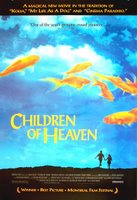 With all of the sabre rattling going on over Iran, I thought it would be a good time to finally see this film.
With all of the sabre rattling going on over Iran, I thought it would be a good time to finally see this film.There is good reason to be concerned with the leadership in Iran right now. It's pursuing a uranium enrichment program that it claims will only be used to produce nuclear energy, but many rightly fear will have military applications (the UN Security Council has given Iran until Aug. 31 to stop the program or face sanctions, see Russia warns Iran over deadline). The current president, Mahmoud Ahmadinejad, is an Fundamental Islamist who openly calls for the annihilation of Israel and supports radical groups such as Hezbollah (see Ahmadinejad: Destroy Israel, End Crisis).
It's very easy to use the behavior of a leader to focus our opinions of an entire nation, as the mainstream media offers us little other insight into these cultures. This is true for the countries the US government is in open conflict with (for example Cuba and Fidel Castro, and North Korea and Kim Jong Il), and in much the same way George Bush has become a stand-in for all Americans to foreign eyes.
For these reasons, it's important to have a window into the lives of the average citizens. "Children of Heaven" (Bacheha-Ye aseman) offers just that as it depicts the story of an impoverished Iranian family struggling to improve its lot. The plot is extremely simple: Ali, a 9 year-old boy, loses his younger sister's shoes while returning with them from the repair shop. For a poor family in Tehran, replacing a pair of shoes is no small task, and the rest of the film shows Ali's attempt to make up for the loss until he can find Zahra a new pair.
The family's concerns are the same as many Americans -- finding enough work to pay the rent and keep food on the table. The mother suffers from a slipped disk and her young children must shoulder more of the household chores as they can't afford the cost of surgery.
The family is religious, but they are not fanatics. The children attend schools that reinforce certain nationalist ideas, but these lessons seem lost on them. What was striking to me was the kindness and caring that pervades the film. Life in the film's Tehran is just like what you might find in cities and towns throughout America -- neighbors taking care of each other, maybe out of an understanding that no one else will.
Granted this is a work of fiction, but the lives portrayed don't have a false ring, and my guess is the story is informed by real-life experience. I'm not sure what the title's relevance is to the film's director. I don't even know how good a translation the English title is, but to me the significance is to reinforce the commonality between all of us. A sobering thought considering the dire situation in the Middle East and the ever darkening storm clouds gathering over it.
One more tidbit: I had read that the conservative, fundamentalist government of Ahmadinejad had come to power based on its promises to address the country's economic woes and growing poverty, rather than some shift toward radical Islam by the citizenry. I found the story below that bears out this sentiment.
Inside Iran: Finding 'Volunteers' to Fight Israel
Daily Hezbollah Rallies Find Enthusiasts and Detractors Who Prefer to Focus on Domestic Concerns
"Iran has other problems — poor people, a lot of them, and unemployment," 24-year-old Armin said. "We need to build our own country."
President Mahmoud Ahmadinejad's repeated public calls for Israel's destruction have gained notoriety for the leader abroad, but at home there is disappointment over his unfulfilled economic promises.
Despite the country's booming oil revenues, unemployment is growing and poverty is rampant.
No comments:
Post a Comment